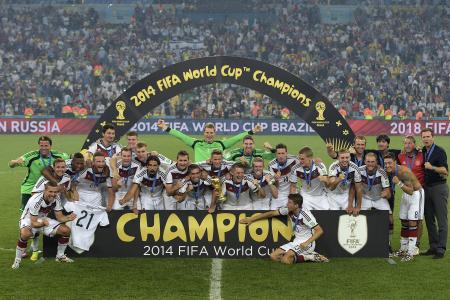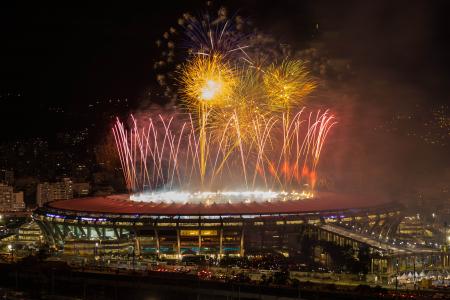After successful World Cup, spotlight turns to Rio's Olympic woes
After a month of scintillating soccer and few of the logistical nightmares that many feared would mar the World Cup, Brazil is touting its success and promising the 2016 Olympics in Rio de Janeiro will be just as good.
To hear Brazilian officials in recent days, the hand-wringing before the World Cup, which ended on Sunday with Germany beating Argentina in the final, was unjustified.
"The only tragedy of the World Cup was that Brazil was beaten," Rio's mayor, Eduardo Paes, said on Friday, referring to the national team's drubbing by Germany earlier in the week.
That is, of course, if you don't count a concrete overpass, one of many unfinished infrastructure projects that were supposed to have been completed before the tournament, that collapsed and killed two people in Belo Horizonte, one of the 12 host cities, days before a semi-final match there.
Photo: London Evening Standard
Or the fact that many problems were averted only because Brazil essentially shut down during the tournament.
In a country where public services and infrastructure routinely buckle, officials avoided the usual traffic jams, overpacked trains and airport chaos by declaring holidays around most games.
Despite a smooth ride for visiting soccer fans, the approach has prompted many in Brazil to argue that the World Cup, rather than showcasing progress, has revealed age-old habits of slipshod and improvisation that make it impossible to deliver quality social services or fast, sustained economic growth.
"It's always about minimizing risk here, not building the type of facilities and services that can handle the actual needs of the country," says Paulo Fleury, an infrastructure and logistics expert at the Federal University of Rio de Janeiro. "There's no effort to really improve overall capacity. You just tell people to stay home and make way for the visitors."

The Maracana stadium in Rio de Janeiro. Photo: Reuters
Instead of leading to vast improvements of the sort that the government promised when Brazil won the right to host the World Cup, delivering the "legacy" benefits to justify the US$11 billion(S$13.7 billion) price tag of hosting it, many now fear the perceived success of the past month will merely endorse Brazil's knack for doing just enough – not all that it could.
In the case of the World Cup, it spent more than US$3 billion (S$3.73 billion) to build or remodel 12 stadiums, at least four of which many fear will become white elephants because they are in cities, like the Amazon port of Manaus and the farm belt capital of Cuiaba, that lie far from the major sports and concert circuits.
Racing to the Olympics
The 2016 Olympics, expected to cost about US$17 billion (S$21 billion) in public and private investment, are already a race against the clock for everything from building venues and fixing roads to at least partially decontaminating the city's severely polluted bay, where Olympic sailors are worried about health risks.
Rio's verdant landscape offers a superb backdrop for the Olympics but hosting them in the often chaotic city poses a vastly different set of challenges from the World Cup.
A prolonged series of multiple competitions means a bigger and more concentrated crush of athletes and visitors.
Whereas the World Cup brought fewer than 750 players from 32 countries, and an expected 600,000 foreign fans spread across 12 host cities, the Olympics will attract some 15,000 athletes from 200 countries and as many as 800,000 foreign spectators, all to Rio.
- Reuters
Get The New Paper on your phone with the free TNP app. Download from the Apple App Store or Google Play Store now


